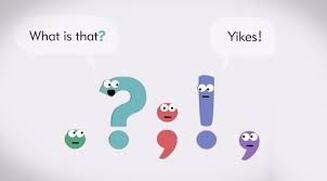 Since Spoonful #60 covered COMMA SPLICES, it's only fair the troublesome twin gets top billing in this spoonful. RUN-ON SENTENCES occur when two complete sentences are smashed together without anything to connect them. Yikes is right! Here's a question to start us off: What's the difference between a RUN-ON SENTENCE and a COMMA SPLICE? Answer: A COMMA SPLICE connects two complete sentences with a comma and nothing else. A RUN-ON SENTENCE doesn't use any punctuation or connectors (like FOR, AND, NOR, BUT, OR, YET, and SO, the FANBOYS of grammar). The key to detecting both of these problems is to understand what constitutes a complete sentence! Every sentence requires a verb. While some sentences consist of a single verb (Run! and Yikes! are two examples), we're interested in complete sentences that also have a subject and an object. Consider the following sentence: My dog pulled on her leash. My dog = the subject; pulled = the verb; and her leash = the object. (If you're interested, on her leash forms a prepositional phrase, which will never form a SUBJECT.) Now consider a 2nd but related sentence: She barked at the noisy geese. She = the subject; barked = the verb; and the noisy geese = the object. To create a RUN-ON SENTENCE, put one after the other without a comma or connector between. Subjects are underlined. My dog pulled on her leash she barked loudly. There are 3 choices to properly connect two complete sentences. These are the same 3 choices shown in the last spoonful! CHOICE#1: Using periods My dog pulled on her leash. She barked loudly. CHOICE #2: Using a comma + a FANBOY (or other connector) My dog pulled on her leash, and she barked loudly. CHOICE: #3: Using a semicolon My dog pulled on her leash; she barked loudly. For more details about FANBOYS, proper semicolon usage, identifying subjects, and subject/verb matching, check out these earlier spoonfuls: Spoonful #3: SUBJECT Spoonful #4: SUBJECT/VERB AGREEMENT Spoonful #9: MEET THE FANBOYS Spoonful #10: FANBOYS STRIKE AGAIN Spoonful #7: SEMICOLONS SPEAK OUT Please accept my most sincere hopes for your continued health and safety. I'll return next Sunday with an appropriate post for Mother's Day! Laura Fineberg Cooper A Spoonful of Grammar
2 Comments
5/9/2020 02:05:29 pm
Run-on-sentences appear much worse to me than comma splices. Perhaps they are the wilder twin. Can yikes really be considered a verb? Thanks for another handy spoonful. Sometimes I read back through a bunch of your posts in hopes the rules will stick when I'm writing. :)
Reply
5/9/2020 02:15:47 pm
Dear Marcia,
Reply
Leave a Reply. |
Welcome to
|
 RSS Feed
RSS Feed
